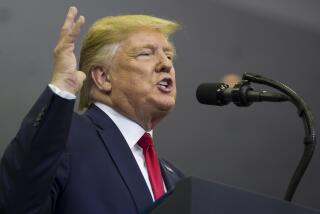Reagan ‘Ticked Off’ by Criticism of Shultz
- Share via
WASHINGTON — The White House expressed confidence Friday in Secretary of State George P. Shultz after his congressional testimony provoked new questions about the Iran arms controversy, and President Reagan was described as “ticked off” about criticism of Shultz.
“The President believes strongly in Secretary Shultz and he has the utmost confidence in Secretary Shultz,” White House spokesman Larry Speakes said.
His remarks were part of a stream of White House statements dominated by the Iran controversy. Later in the day, the White House issued a statement saying that the United States would regard expansion of the war between Iran and Iraq “as a major threat to our interests as well as to those of our friends in the region.”
Reassuring Allies
The presidential statement, made in the wake of the fierce fighting near the Iraqi city of Basra, was intended to assure regional allies that the Iran affair has neither dimmed U.S. determination to limit the spread of the fighting nor dampened the Administration’s interest in the security of the moderate Arab states in the region, an Administration official said.
Speakes volunteered the affirmation of confidence in Shultz, whose position in the Administration has at times appeared precarious as a result of his opposition to the U.S. approaches to Iran.
On Wednesday, the secretary testified in a closed hearing of the House Foreign Affairs Committee that State Department and Central Intelligence Agency officials had met in Europe with representatives of Iran in December. The meeting occurred at least one month after the arms shipments to Iran were disclosed and several weeks after the disclosure that money from the arms sales had been diverted to rebels fighting the Sandinista regime in Nicaragua.
In addition, congressional sources say, Shultz testified that CIA representatives met subsequently with Iranian representatives after the State Department had cut off the renewed talks on learning that additional arms sales were on the agenda.
‘It’s His Job’
“We at the White House do not have any problems with Secretary Shultz testifying before the House Foreign Relations Committee. It’s his job to go up there and to be responsive to questions,” Speakes said.
He contradicted a report in Friday’s editions of the New York Times which said that White House officials were irritated with Shultz.
Speakes said he had spoken to White House Chief of Staff Donald T. Regan and Frank C. Carlucci, the President’s new assistant for national security affairs, and found that “neither of them” made the remarks reflected in the report. The “senior staff at the White House is mightily ticked off about this,” he added.
When asked if Reagan too was “ticked off,” Speakes replied: “I haven’t talked to the President this morning, but I can assure you he is.”
Problem Resolved
In an unusual statement Friday evening, the State Department--which earlier had refused to comment on Shultz’s ostensibly secret testimony--confirmed that there had been a dispute over the CIA contact with the Iranians but that the problem had been resolved.
The two agencies “are working cooperatively and closely together on how we deal with Iran,” State Department spokesman Charles Redman said. “During his testimony, the secretary expressed concern about one unauthorized contact in December, but this issue has been resolved.”
In another development, a spokesman for Atty. Gen. Edwin Meese III said that Meese and Lt. Col. Oliver L. North had talked by phone or face to face between six and 12 times in the last two years--before the attorney general learned in November that North had diverted secret Iranian arms sales profits to Nicaragua’s rebels.
But the spokesman, Terry Eastland, denied and branded as “a dog of a story” a Wall Street Journal report that North, who was fired from the National Security Council after the Iran- contra link came to light, regularly discussed his efforts to provide funds to the contras with Meese.
“He has no recollection of that being discussed,” Eastland said. “The attorney general has said repeatedly that he didn’t know about the diversion (of the arms funds) prior to Nov. 22-23,” when Meese and a team of close aides uncovered documentary evidence about the fund transfer and interviewed North, the spokesman added.
Contacts Not Surprising
Eastland said that the contact between Meese and North should not be surprising because of Meese’s membership on the NSC, where North served on the staff.
Other Justice Department sources said that the estimate of six to 12 contacts was probably on the low side. “They talked frequently,” one said, noting that Meese had interrupted Justice Department meetings on more than one occasion to take a call from North.
Meese rejected a Times request to examine his logs of telephone and personal contacts in connection with the North matter.
Times staff writer Doyle McManus contributed to this story.
More to Read
Sign up for Essential California
The most important California stories and recommendations in your inbox every morning.
You may occasionally receive promotional content from the Los Angeles Times.













